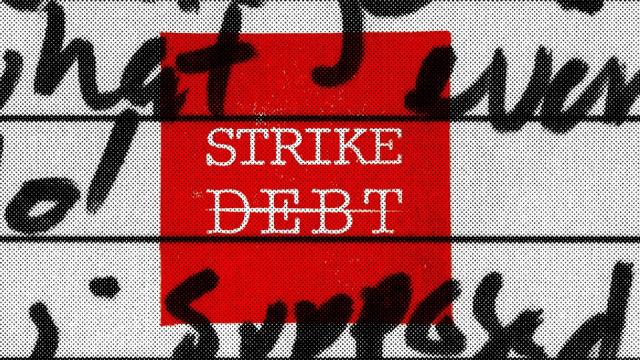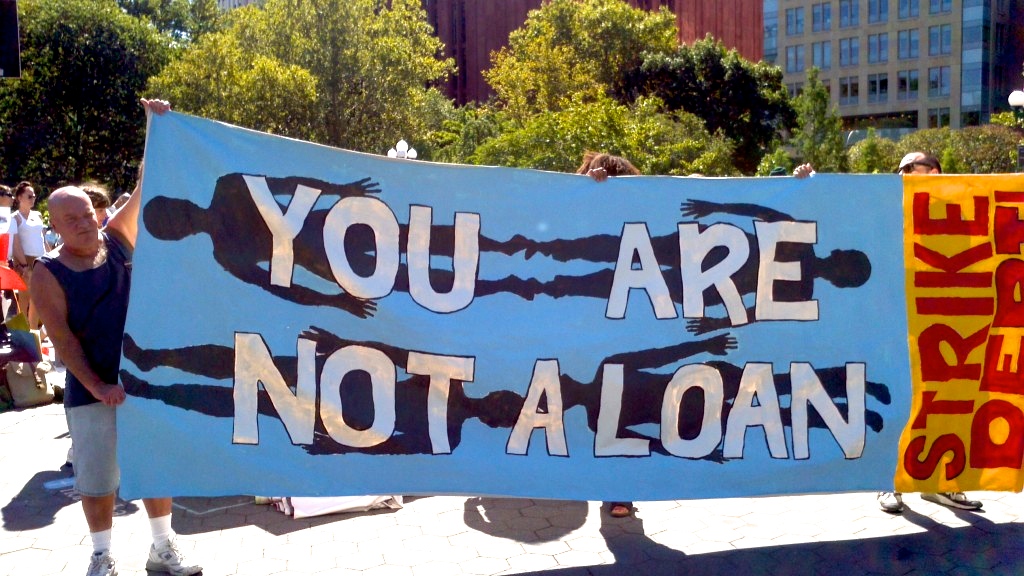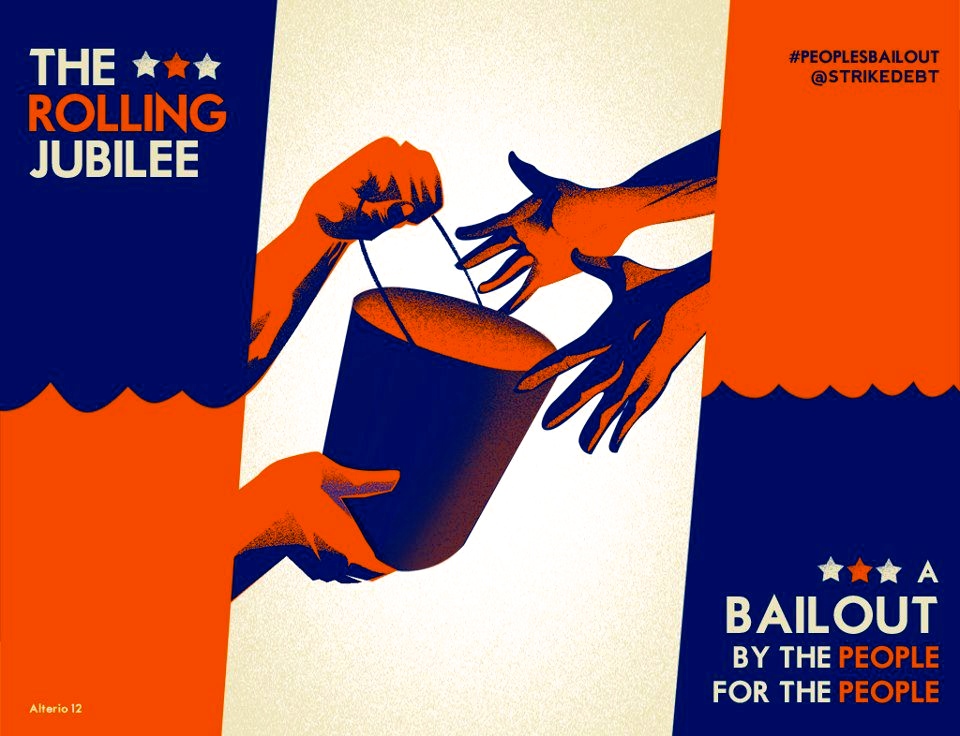
One of the principal slogans of the Occupy movement was, "Banks got bailed out — we got sold out!" Strike Debt New York arose to explicate that slogan. While banks were given a debt jubilee — thanks to us, the tax payers — the millions of underwater homeowners, student debtors, and people going bankrupt from medical bills, not to mention entire municipalities, were left to fend for ourselves.
Debt unites us all. Whether or not we have personal loan agreements or are in danger of foreclosure, we live in cities and towns that have been swindled in municipal bond markets. Strike Debt is one of the many and varied progeny of Occupy Wall Street, and in particular it arose to rethink debt as a systemic, political issue.
Strike Debt Bay Area (SDBA) began in the fall of 2012 after an Occupy Wall Street activist arrived in Oakland from New York City, and many from Occupy Oakland got together to watch livestream coverage of the Rolling Jubilee – a Strike Debt program that went on to forgive over $15 million dollars of medical debt.
SDBA’s first action was a Debtors' Assembly, held in the Fruitvale neighborhood of Oakland in February 2013, and attended by over 70 people. Where banks feel no shame about their massive debts, but instead intimidate the government into subsidizing their risks, individual debtors are often overcome with anxiety, worry, humiliation and isolation. They blame themselves for their medical or student debt burdens, not realizing that billions of other Americans are in the same position because the cost of simply living (a roof over our head, an education, medical care) has skyrocketed.
Debtors' Assemblies are designed to help individuals realize that "You Are Not a Loan": that debt is a systemic problem. Our first Assembly was devoted to testimony – initially from some of us to break the ice, and then from the audience – about our various forms of debt. Our underlying theme was, “How can we change debt from an issue of individual shame to a platform for collective action?”
An organizing committee met frequently all spring, discussing the use of debt as a mechanism of control, and its impact on the choices people can make about their own lives. After holding another Debtors’ Assembly in San Francisco in May 2013, a series of projects emerged that had to do with debt on all levels, from individual to municipal to federal. These ongoing projects include:
1. Fighting the sale of the Berkeley Post Office. The excuse for selling our post offices is that the U.S. Postal Service is broke, but that’s a myth. The truth is that the USPS was saddled with a formidable and totally unnecessary debt in 2006 by the Republican Congress. They passed a law mandating that the Post Office prepay 75 years of health insurance for its retirees, something no other government agency or private corporation must do.
This appalling debt made the Post Office a perfect example of the disastrous effects of debt on our society; in this case, as a wedge to privatize our commons. Strike Debt Bay Area joined with others already working on legal challenges to the sale, testified at City Council meetings, and finally, in August 2013, set up tents and occupied the steps in front of the historic 1914 building for the whole month. We held seminars, showed movies, engaged and fed the homeless, and made a clear statement to prospective buyers that they will not take our commons without a fight.
More recently, we have expanded our post office campaign to protest at local Staples stores, where some branches have installed mini-post offices on a trial basis. These mini-post offices are staffed by Staples workers at Staples salaries, not the unionized living wages the Post Office pays.
2. Organizing a Politics of Debt Study Group. The group, which got organized last fall, meets every other week to discuss major readings in the politics of debt and monetary theory. They presented at the Occupy San Francisco Forum in March 2014.
3. Initiating Talks for a Public Bank. Strike Debt Bay Area has begun working with associates of San Francisco Supervisor John Avalos to start a public bank. We also assisted in writing a policy paper for the Siegel for Oakland mayoral campaign, providing the rationale for and endorsing a “Public Bank of Oakland.”
4. Fighting for Richmond's Homeowners We have been very supportive of Richmond's efforts to use eminent domain to rescue underwater homeowners. Although the city has voted three times to implement a blight-prevention program, Richmond still needs another California city to join them as part of a Joint Powers Authority, in order to bring the program into existence.
SDBA has been trying to find a willing partner for Richmond and to that end our members have testified at Council meetings in Oakland and Berkeley, and are meeting with representatives and community activists in Vallejo, Fairfax and San Francisco. We see eminent domain as one strategy to get the banks to restore peoples’ above-water ownership of their homes.
We are eager to pursue other strategies, such as the broken chains of title and mass action lawsuits based on the recent California court decision Glaski v. Bank of America as other ways to stop foreclosures. Mortgages are the largest category of individual indebtedness in the U.S. and the foreclosure pipeline remains a crime-riddled jackpot for the big banks. SDBA members have written about radical solutions to the mortgage crisis here and here.
5. Re-Publishing the Debt Resisters' Operations Manual. We organized a well-attended publishing party in March for the new edition of the Debt Resisters’ Operations Manual, produced by our New York counterparts, where we sold or gave away about a hundred copies.
6. Producing Strike Debt Radio Produced as six 10-minute shows airing on Pacifica’s KPFA in Berkeley, Strike Debt Radio consists of “women-on-the-street” conversations, interviews with debt resistors, music, data and analysis, and advertisements for alternatives to indebtedness.
We have explored student debt with Andrew Ross, Annie Mclanahan and Justin Tombolesi; What is Money with Ellen Brown of the Public Banking Institute; and the Federal Reserve with Stephen Zarlenga of the American Monetary Institute. All shows are available here.
7. Applying to Vallejo Participatory Budgeting process. In order to start a non-profit check cashing/payday loan business, Strike Debt Bay Area met with the staff of Community Check Cashing located in the Fruitvale neighborhood of Oakland, which may be the only nonprofit check cashing facility in the country. They have a very low default rate because they spend a lot of time counseling their customers about money management. We would like to figure out how to help replicate their model and make it financially sustainable in both Vallejo and Oakland.
8. Presenting talks across the Bay Strike Debt Bay Area has presented at Occupy San Francisco Forum, California Institute of Integral Studies, Acorn Books, Suds Snacks and Socialism, and other venues on the centrality of debt to contemporary forms of capitalism and what Strike Debt plans to do about it.
9. Holding Berkeley seminars Most recently, SDBA spun off a UC Berkeley chapter, which held two seminars with visiting scholar and New York Strike Debt member Andrew Ross, and will hold a Debtors’ Assembly on campus in the near future. Strike Debt advocates a platform for truly public education, which is far more possible than we have been led to imagine. Read about it in this “How Far to Free?”article.
Debt impoverishes the many while profits accrue to the few. Mass indebtedness is a symptom of finance capitalism where our debt payments (for student loans, for mortgages, for credit cards, for municipal bonds) fuel the destructive fire of Wall Street.
But Strike Debt believes that debt also holds the key to our collective liberation. Once we begin to understand debt as a platform for collective action and resistance, we realize that we have power over Wall Street. Imagine a debtors’ union that could both threaten and realize coordinated debt strikes – not only to renegotiate principal amounts or interest rates, but also to demand debt jubilees. The banks got a debt jubilee and if we organize, so can we. We, the millions of debtors, are too big to fail.
Find out more here and learn how to get involved by writing to strike.debt.bay.area@gmail.com.
3 WAYS TO SHOW YOUR SUPPORT
- Log in to post comments

















